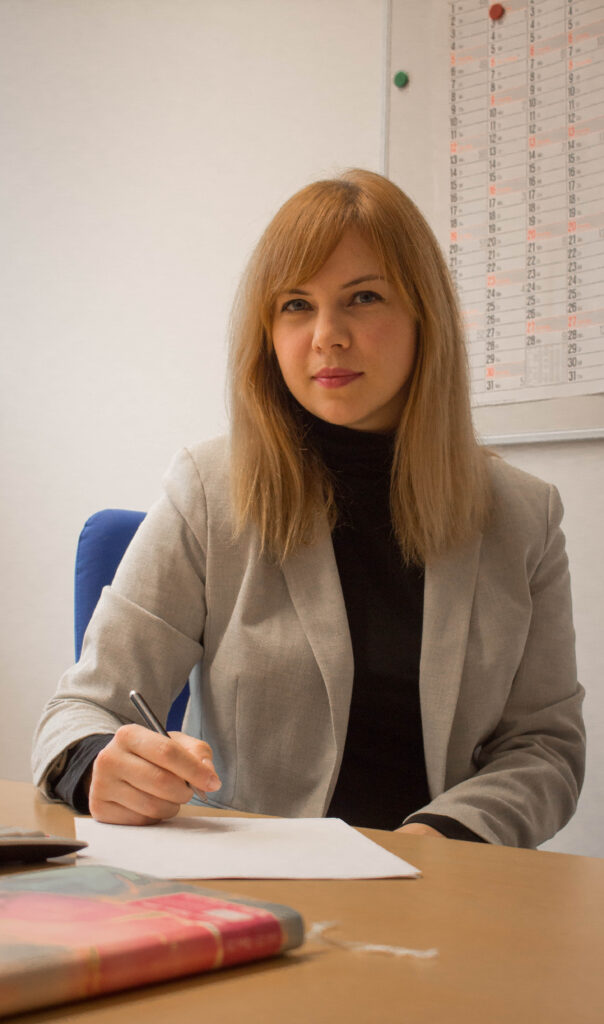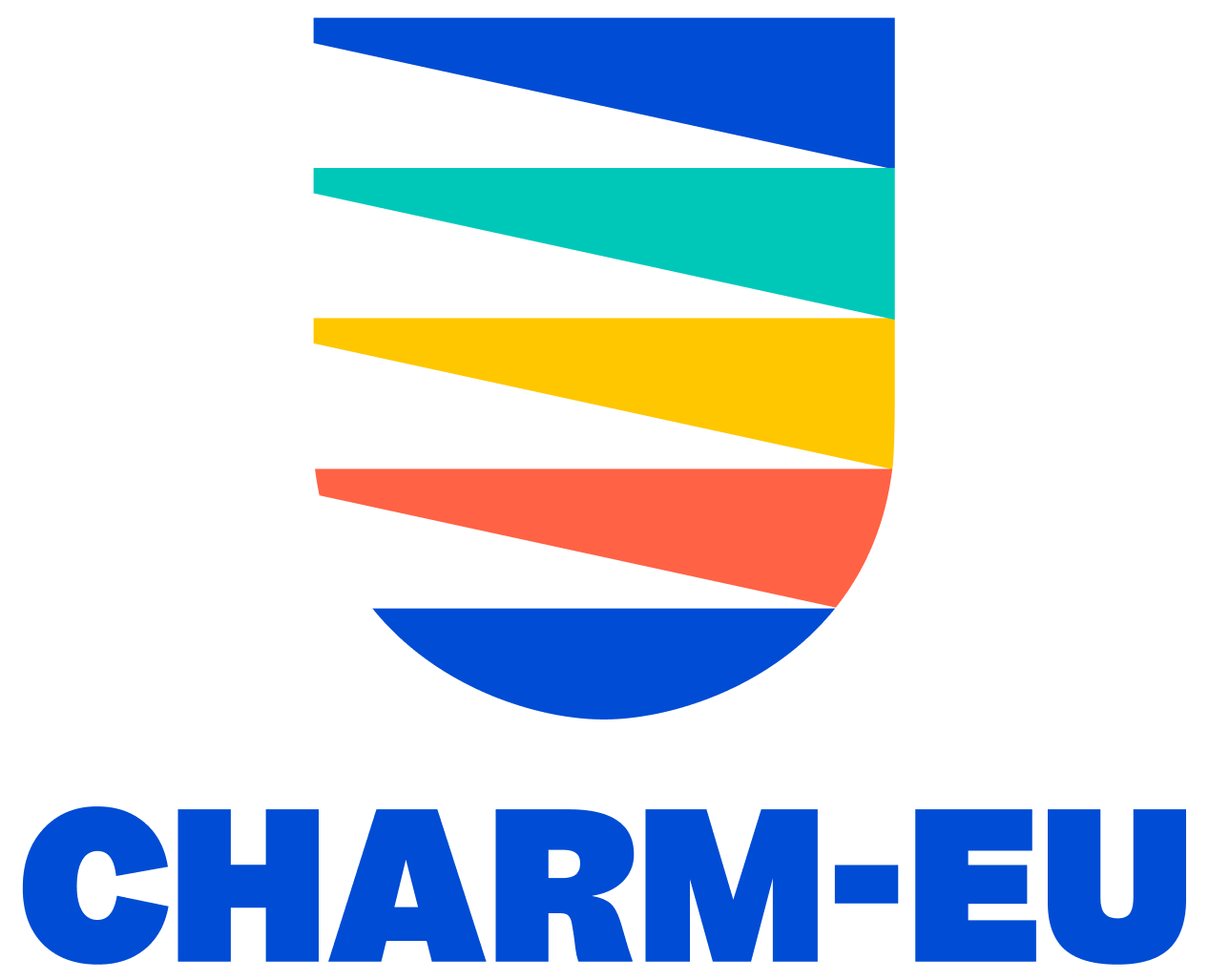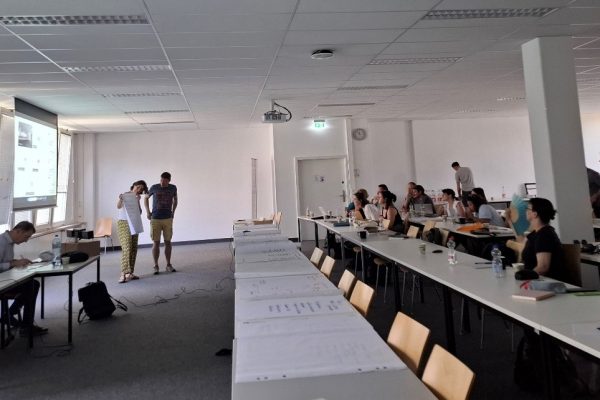A Community of Innovation
The session began with a brief introduction to CHARM-EU by Nicolas De Keyser from Hochschule Ruhr West. CHARM-EU, an alliance of nine European universities, is committed to reimagining higher education; its emphasis on challenge-based learning, sustainability, and inclusivity, provides fertile ground for pedagogical experimentation and innovation.
Best Practices in Action
Several CHARM-EU teachers took the stage to present their tried-and-tested hybrid teaching methods. Each presentation was followed by a lively Q&A and discussion, allowing participants to delve deeper into the practicalities and philosophies behind each approach.
Highlights included:
- Interactive Learning Environments: Ádám Tóth from Utrecht University demonstrated how he uses Wooclap to foster real-time engagement and interaction between online and in-person students. By integrating live polls, word clouds, and quizzes into his sessions, he creates an inclusive and dynamic learning atmosphere where all students can contribute equally, regardless of their physical location. This approach not only boosts participation but also provides immediate feedback, helping to adapt the pace and focus of the session to students’ needs.
- Teaching by Empowering: Decision-making process in groups, emotions shaping performance and learning, enhanced students’ participation, and other related aspects were considered by Valérie Borrell Estupina from the University of Montpellier. The presenter highlighted how recognizing and addressing the emotional dimensions of learning, such as confidence, frustration, or enthusiasm can shape both individual and group performance. By fostering empathy and creating a psychologically safe environment, students are more likely to participate actively, support one another, and engage deeply with the learning material, ultimately leading to more meaningful and sustained learning outcomes.
- Supervision of Interdisciplinary, Challenge-based Research Projects (Capstone Products): Between 2022 and 2024, three CHARM-EU Capstone Teams were organized, supervised, and mentored at ELTE, guiding students through their final projects. Andrea Velich from Eötvös Loránd University (ELTE) shared her experience of providing hands-on support to help students navigate complex real-world problems in a transdisciplinary environment while developing collaborative and critical thinking skills.
- Catch up Sessions on Capstone Projects: Each session is purposefully aligned with the students’ progress, focusing on key milestones within their long-term assignments and the overall module timeline. The content and structure of the sessions are flexible, allowing students to tailor them to their evolving needs and learning goals. Annisa Triyanti from Utrecht University shared her insights on this format, which fosters peer feedback and collaboration, helping to reduce the sense of isolation that can arise from working in separate project groups.
- Teaching Shadowing by Educationalists: CHARM-EU Educationalist Alex Arenas Canon from the University of Montpellier recently partnered with Master’s programme professor Hélène Charreire in an experimental teaching shadowing initiative within CHARM-EU Master’s in Global Challenges for Sustainability. Alex’s role was to support Hélène by offering an external, expert perspective on her classroom dynamics and pedagogical approach. Each teaching session followed a simple format: Alex would observe Hélène’s classes, and afterwards they would debrief together—discussing how to refine the learning experience through adjustments in classroom dynamics, the presentation of course content and improving student engagement, without altering the academic content itself. This required a strong foundation of trust, openness, and shared purpose. The initiative demonstrated how teaching shadowing—whether between educationalists and professors, or among teaching peers—can serve as a valuable tool for co-creating more effective, student-centred learning environments across the CHARM-EU alliance (or even beyond).
- Teaching Practices for Engaging Minds and Connecting Ideas: 3-2-1 Bridge from a Thinking Routine Project Zero, Harvard Graduate School of Education, was presented by Nataliia Lazebna from Julius-Maximilians Universität Würzburg as the teaching method, which helps students to reflect on their learning, encourage them to articulate their initial understanding of a topic before the learning experience and compare it with their current perspective. By identifying how and why their conceptions have changed, students can gain deeper insight into their learning process and develop greater metacognitive awareness.

“In a hybrid learning space where cultures, languages, and technologies meet, the most powerful teaching practice is one that opens minds and hearts, inviting all educators to co-create, reflect, and grow beyond borders.” Nataliia Lazebna, Education Manager CHARM-EU at Julius-Maximilians-Universität Würzburg.
Fostering Exchange and Inspiration
The true strength of the session lay in its spirit of openness and exchange. Teachers not only shared what worked for them but also discussed the challenges they faced, such as technical glitches, student engagement issues, and the complexities of balancing synchronous and asynchronous learning.
Participants left the session motivated with a toolkit of ideas to experiment with in their own teaching. The event underscored the value of community in educational innovation and the power of shared experience in navigating the evolving landscape of hybrid learning.
Looking Ahead
As hybrid teaching continues to evolve, CHARM-EU remains at the forefront of pedagogical transformation. Events like this one are vital in building a resilient, adaptable, and inclusive educational future, the one where teachers learn from each other and students benefit from the best of both worlds.
This article was written by Nataliia Lazebna and Katrin Niewalda. The original version in German of this article was published in WueDive Toolbox

